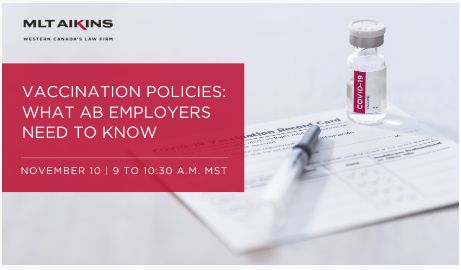- within Transport and Insurance topic(s)
- with Senior Company Executives, HR and Inhouse Counsel
- with readers working within the Accounting & Consultancy, Insurance and Healthcare industries
Since the announcement of Alberta's Restrictions Exemption Program and the City of Calgary's COVID-19 Vaccine Passport Bylaw, companies in Alberta are increasingly implementing policies that require presentation of proof of vaccination or negative COVID-19 test results as a condition of employment or prerequisite to in-person customer-service.
The prevalence of such policies may create mounting tension between companies that are seeking to implement vaccination policies in line with Government policy and medical advice, and individuals who feel that such policies unfairly restrict their rights and freedoms.
The Alberta Human Rights Commission's (the "AHRC") recently published Guidance titled "Vaccine mandates and proof of vaccination," which offers some insight into how the AHRC may address complaints relating to vaccination policies.
Personal Preference Not a Protected Ground
According to the Guidance, the AHRC cannot address complaints about perceived violations of Charter rights or concerns grounded in personal opinion or political viewpoints. The AHRC has taken the stance that public health and safety considerations outweigh individuals' feelings that COVID-19 restrictions violate their rights to personal agency, privacy and bodily integrity, stating:
In Canada, we enjoy the protection of the right to 'life, liberty and security of the person' under section 7 of the Charter of Rights and Freedoms. We are used to these protections and voicing concerns when our rights are put at risk. However, even Charter rights are subject to reasonable limits as demonstrably justified in a free and democratic society (section 1 Charter). The balancing of health and safety pressures during a pandemic may override certain rights, for a time, in the interest of protecting the general public from COVID-19.
Proof of Vaccination Policies may be Permissible under Human Rights Legislation
Guidance on Customer Vaccination Policies
According to the AHRC:
the requirement to show that a person has been vaccinated before they can enter certain businesses is permissible under the Alberta Human Rights Act, as long as those who have valid exemptions are reasonably accommodated.
This statement suggests vaccination policies applicable to customers will not offend Alberta human rights law provided they accommodate customers who cannot be vaccinated due to a valid medical exemption or another protected human rights ground. For example, the AHRC suggests requiring negative COVID-19 test results rather than proof of vaccination from customers who are medically unable to become fully vaccinated. For companies concerned with health and safety risks, the AHRC recommends offering unvaccinated customers alternatives to in-person service such as shopping and delivery or curbside pickup, rather than allowing for exemptions to their vaccination policies.
It is important to note that this Guidance has yet to be tested by the Alberta Human Rights Tribunal (the "Tribunal") and it cannot be relied on to defend discriminatory vaccination policies.
Guidance on Employee Vaccination Policies
The AHRC's Guidance suggests that employers can implement vaccination policies applicable to employees without offending the Alberta Human Rights Act so long as such policies provide accommodation for employees who cannot be vaccinated for valid medical reasons or a reason based in another protected ground. The AHRC refers to religious beliefs as another potential ground, but offers very little guidance on how that will be applied or interpreted in the context of a vaccination policy.
Employers Can Request Information to Verify a Medical Exemption
To determine if an employee accommodation request is based on a valid medical exemption, the Guidance advises employers to require the employee to provide a signed letter from their physician confirming that there is a medical reason for not being vaccinated. The letter should identify the employee by name, set out the period for which the exemption will be valid, and include the medical professional's name, professional registration number and contact information. This complies with guidance from the Government of Alberta and Alberta College of Physicians and Surgeons concerning valid medical exemptions.
If an employee has a valid medical exemption, the AHRC states employers can accommodate by allowing the employee to work from home or submit to regular PCR testing. According to the AHRC, "[a] positive COVID-19 test result must not lead to automatic negative consequences, such as employee discipline or termination." Rather, employers should remain cautious of implementing overly strict vaccination policies.
Other Considerations for Companies Considering Proof of Vaccination Policies
This recent Guidance from the AHRC offers some comfort to employers that have or are considering implementing vaccination policies. However, it remains to be seen how the Alberta Human Rights Tribunal will interpret what exemption requests are valid and on which grounds. For example, it remains to be seen whether, how and to what degree religious exemption requests need to be accommodated by employers and service providers. Likewise, it is important to remember that vaccination policies may be challenged on other legal grounds not discussed in this article. The AHRC Guidance does not provide a comprehensive overview of the legality of vaccination policies.
Employers with questions regarding the implications of mandatory vaccination policies in their workplaces or any questions regarding vaccination and COVID-19 testing policies should contact a member of our labour and employment law team.
The content of this article is intended to provide a general guide to the subject matter. Specialist advice should be sought about your specific circumstances.




